Which Foreign Policy Paradigm for the USA? Hegemony and Annihilation or Restoration of Sanity?
Compared to the great initiatives taken on behalf of freedom and anti colonialism throughout the past 260 years, the United States of America of the past several decades appears to be a strange and foolish creature running roughshod over the dignity of people and nations in a race for mass nuclear extermination.
A renewed Cold War hysteria has been stirred up, which is quickly turning hot, as Lavrov warned in a recent speech that we are now closer to thermonuclear war than we were during the Cuban Missile Crisis of 1963. Today’s Cold War revival exhibits a rabid anti-Chinese/Russian paranoia despite the fact that both nations have repeatedly called for cooperation and friendship with the USA for years.
From the recent fall of Syria to CIA-backed terrorists, escalating military maneuvers on Russia’s border, to belligerent military expansion in China’s backyard, to radical Zionists pushing for war with the entire Arab world, it seems that everywhere one looks, we find the same lemming-like commitment to playing a nuclear game of chicken in the hopes of psychologically breaking the Multipolar Alliance led by Russia, China and a growing array of nations taking part in the ever-growing Belt and Road Initiative.
Trump is the first president in decades that has invoked the prospect of restoring the American System tariff policy last seen over a century ago, with a focus on economic development and win-win cooperation abroad.
But is Trump capable, competent or honest enough to get these objectives enacted?
Are the monetarist Wall Street cultists, Soros regime change acolytes and Zionist warmongers too much for Trump, or might their insane agenda to light the world on fire be overcome by patriots today?
China’s former Ambassador to Washington Cui Tiankai recently acknowledged this threat of a world war between China and the USA, but took the high road calling for reasonable dialogue, saying, “China and the USA need to recapture the spirit of cooperation from WWII and join hands to confront our common enemies in the new era.”
In the same speech, it is ironic that the Chinese Ambassador quoted America’s martyred president in that same speech, saying, “the best way to predict the future is to create it”.
With these words in mind, let us revisit the two opposing global policy options the USA had available to it at the turn of the last century while the Civil War hero William McKinley still presided in the office of the presidency in 1901.
At this crucial moment in world history, it was still undetermined whether America would hold on to its anti-imperial traditions or embrace a new imperial identity.
The Last Lincoln Republican
In 1901, speaking at the Pan-American Exposition, which featured grand visions of rail grids connecting all of the Americas driven by national banking, protectionism and bilateral treaties, McKinley stated his vision for a new age of win-win cooperation that was then emerging[1]:
“The Tower of Light is the tower of peace and good will, whose turrets already appear above the horizons of the future. Science, discovery, and industry are the great, immortal democrats whose teaching shall wipe out political boundaries, and heal national jealousies, and sweep hitherto hostile units into the great current of a commonweal. Monarchies and oligarchies cannot prevail against them, for they find a place for every man and bring him to it in freedom and self-respect. We shall have all America united; and what America becomes is the prototype of what the world must be.''
In an earlier 1898 speech, McKinley clearly outlines his understanding of the evils of British Free Trade and stands firmly for a system of national sovereignty defined by protective tariffs and internal improvements for all.
Striking at the heart of Adam Smith’s doctrine of “buying low and selling dear” and the obsession for cheap goods, which only reduces the value of labor to ever lower conditions of life, McKinley said:
“They say `everything would be so cheap,' if we only had free trade. Well, everything would be cheap and everybody would be cheap. I do not prize the word `cheap.' It is not a word of hope; it is not a word of comfort; it is not a word of cheer; it is not a word of inspiration! It is the badge of poverty; it is the signal of distress; and there is not a man in the audience, not a white-haired man, who, if he will let his memory go back, will not recall, then when things were the cheapest, men were the poorest.... Cheap? Why, cheap merchandise means cheap men, and cheap men mean a cheap country; and that is not the kind of Government our fathers founded, and it is not the kind their sons mean to maintain.
If you want cheap things, go where you can get them.... We want labor to be well paid.”
Despite his flaws and compromises, President William McKinley must be understood essentially as the last of the great republican peacemakers and an anti-imperialist of the highest order.
The last President to fight in the Civil War, McKinley was also a strong supporter of two complementary policies:
1) Internally, he was a defender of Lincoln’s “American system” of protectionism, internal improvements, productive credit and African-American suffrage and
2) Externally, he was a defender of the Monroe Doctrine that defined America’s anti-imperial foreign policy since 1823.
Monroe Doctrine or Empire?
The Monroe Doctrine’s architect John Quincy Adams laid out this principle eloquently on July 4, 1821[2], stating that the United States, within its first fifty years
“without a single exception, respected the independence of other nations while asserting and maintaining her own.
She has abstained from interference in the concerns of others, even when conflict has been for principles to which she clings, as to the last vital drop that visits the heart.
She has seen that probably for centuries to come, all the contests of that Aceldama the European world, will be contests of inveterate power, and emerging right.
Wherever the standard of freedom and Independence has been or shall be unfurled, there will her heart, her benedictions and her prayers be.
But she goes not abroad, in search of monsters to destroy.
She is the well-wisher to the freedom and independence of all. She is the champion and vindicator only of her own.
That by involving itself in the internal affairs of other nations, the United States would destroy its own reason of existence; the fundamental maxims of her policy would become, then, no different than the empire America’s revolution defeated. It would be, then, no longer the ruler of itself, but the dictator of the world.”
America’s march is the march of mind, not of conquest.
Colonial establishments are engines of wrong, and that in the progress of social improvement it will be the duty of the human family to abolish them”.
It was an aging John Quincy Adams with whom a young Abraham Lincoln collaborated in ending the imperial Mexican-American war under Wall Street stooge James Polk in 1846.
When Adams died in 1848, Lincoln picked up the torch left behind by the great statesman as the London-directed “proto deep state” of the 19th century worked to dissolve the republic from within. The foreign policy conception laid out by Adams ensured that America’s only concern was staying out of foreign imperial entanglements, as Washington had earlier warned during his 1796 Farewell Address[3], and keeping foreign imperial interests out of the Americas. The idea of projecting power onto the weak or subduing other cultures was anathema to this genuinely American principle.
A major battle which has been intentionally obscured from history books took place in the wake of Lincoln’s murder and the re-ascension of the City of London-backed slave power during the decades after the Union victory of 1865.
On the one hand, America’s role in the emerging global family of nations was being shaped by followers of Lincoln, who wished to usher in an age of win-win cooperation. Such a system, which Adams called “a community of principle” asserted that each nation had the right to sovereign banking controls over private finance, productive credit emissions tied to internal improvements with a focus on continental (rail/road) development, industrial progress and full spectrum economies.
Adherents of this program included Russia’s Sergei Witte and Alexander II, Germany’s Otto von Bismarck, France’s President Sadi Carnot and Finance Minister Gabriel Hanotaux, not to mention leading figures within Japan’s Meiji Restoration.
On the other hand, “eastern establishment families” of the USA more loyal to the gods of money, hereditary institutions and the vast international empire of Britain saw America’s destiny tied to an imperial partnership with the mother country.
These two opposing paradigms within America have defined two opposing views of “progress”, “value”, “self-interest” and “law,” which have continued to shape the world to this very day.
William Gilpin vs Alfred Mahan: Two Paradigms Clash
A champion of the former traditionally American outlook who rose to the international scene was William Gilpin (1813-1894)[4].
Gilpin hailed from a patriotic family of nation builders whose patriarch Thomas Gilpin was a close ally of Benjamin Franklin and leading member of Franklin’s Philosophical Society.
William Gilpin was famous for his advocacy of America’s trans continental railway, whose construction he proselytized as early as 1845. This railway was finally begun by Lincoln during the Civil War and completed in 1869.
The project was a milestone accomplishment as the world’s first ever trans-Continental railway, and served as an example for similar programs internationally, with American-made railcars soon being sent to Russia, where teams of American rail engineers were helping their Russian counterparts construct the Trans Siberian Railway.
The Trans-Continental Railway (1862-1869)
In his thousands of speeches and writings, Gilpin made it known that he understood America’s destiny to be inextricably tied to both Russia and also the ancient civilization of China—not to impose opium as the British and their American lackies were wont to do, but rather to learn from and even emulate!
In 1852, Gilpin stated[5]:
“Salvation must come to America from China, and this consists in the introduction of the “Chinese constitution” viz. the “patriarchal democracy of the Celestial Empire”. The political life of the United States is through European influences, in a state of complete demoralization, and the Chinese Constitution alone contains elements of regeneration. For this reason, a railroad to the Pacific is of such vast importance, since by its means the Chinese trade will be conducted straight across the North American continent.
This trade must bring in its train Chinese civilization. All that is usually alleged against China is mere calumny spread purposefully, just like those calumnies which are circulated in Europe about the United States”.
With Lincoln’s 1861 presidential victory, Gilpin became the President’s bodyguard, and ensured Lincoln survived his first assassination attempt en route to Washington from Illinois[6].
During the Civil War, Gilpin was appointed Colorado’s first Governor, where he successfully stopped the southern slave power from opening up a western front (applying Lincoln’s greenback system to finance his army on a state level) and winning the “Battle of Glorieta Pass of 1862”[7], which went far in saving the union.
After the war, Gilpin became a leading advocate of the internationalization of the “American system of political economy,” which Lincoln applied vigorously during his short-lived presidency.
Citing the success of Lincoln’s system, Gilpin said:
“No amount of argument will make America adopt old world theories… To rely upon herself, to develop her own resources, to manufacture everything that can possibly be manufactured within her territory- this is and has been the policy of the USA from the time of Alexander Hamilton to that of Henry Clay and thence to our own days”.[8]
Throughout his speeches, Gilpin emphasized the role of a U.S.-Russia alliance[9]:
“It is a simple and plain proposition that Russia and the United States, each having broad, uninhabited areas and limitless undeveloped resources, would by the expenditure of 2 or 3 hundred millions apiece for a highway of the nations threw their now waste places, add a hundredfold to their wealth and power and influence”
And seeing in China the means to usher in a new renaissance—including the decadent and corrupt culture of Europe, Gilpin said[10]:
“In Asia, a civilization resting on a basis of remote antiquity has had, indeed, a long pause, but a certain civilization- although hitherto hermetically sealed up has continued to exist. The ancient Asiatic colossus, in a certain sense, needed only to be awakened to new life and European culture finds a basis there on which it can build future reforms.”
In opposition to the outdated British controls of “choke points” on the seas, which kept the world under the clutches of London, Gilpin advocated loudly for a system of internal improvements, rail development, and harmonization of diverse cultures through the universal medium of scientific and technological progress.
All great statesmen have understood that this universal character of progress transcends linguistic, ethnic and religious divisions, which too often induce humanity into division, wars and ignorance. It is thus the only foundation for a genuine governing ideology for all mankind, upon which the precious uniqueness of each culture’s diversity can rest on firm foundations.
Once a global system of mutual development were established, Gilpin stated: [11]
“in the shipment of many kinds of raw and manufactured goods, it will largely supersede the ocean traffic of Great Britain, in whose hands is now carrying the trade of the world.”
Gilpin’s vision was most clearly laid out in his 1890 magnum opus, “The Cosmopolitan Railway,” which featured designs for development corridors across all continents united by a “community of principle”.
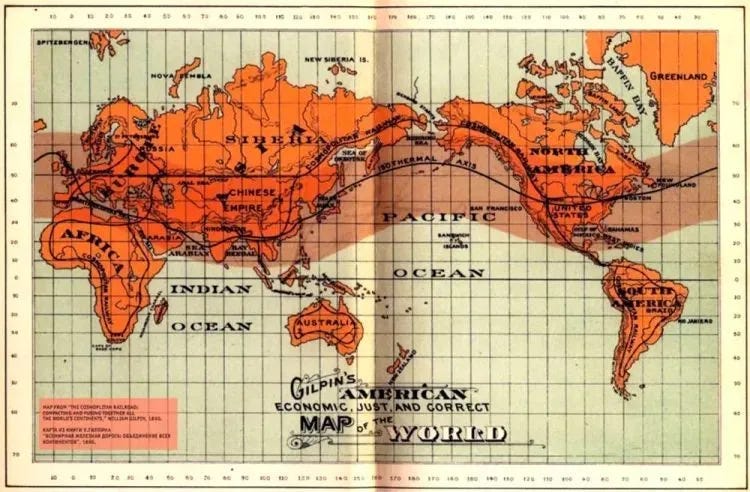
Echoing the win-win philosophy of Xi Jinping’s New Silk Road today, Gilpin stated[12]:
“The cosmopolitan railway will make the whole world one community. It will reduce the separate nations to families of our great nation… From extended intercommunication will arise a wider intercourse of human ideas and as the result, logical and philosophical reciprocities, which will become the germs for innumerable new developments; for in the track of intercommunication, enterprise and invention invariably follow and whatever facilitates one stimulates every other agency of progress.”
Mahan Derails America’s Anti-Imperial Identity
Alfred Thayer Mahan (1840-1914) represented an opposing paradigm, which statesmen like Lincoln, Secretary of State James Blaine, William Seward, President Grant, William Garfield, and McKinley detested.
Sadly, with McKinley’s 1901 murder and the rise of Teddy Roosevelt in 1901, it was not Gilpin’s, but rather Mahan’s worldview which became the dominant foreign policy doctrine for the next 120 years.
Mahan is commonly credited for being a co-founder of modern geopolitics and an inspiration for Lord Halford Mackinder.
Having graduated from West Point’s naval academy in 1859, Mahan soon became renowned as a total failure in actual combat, having crashed warships repeatedly into moving and stationary objects during the Civil War. Since reality was not his forte, Mahan focused his post-war career on ivory tower theorizing, gushing over maps of the world and fawning over Britain’s power as a force of world history.
His ‘Influence of Sea Power Upon History 1660-1783’[13] published in the same year as Gilpin’s Cosmopolitan Railway (1890) was a total break from the spirit of win-win cooperation that defined America’s foreign policy until that point.
According to historian Francis P. Sempa[14], this book soon “became the bible for many navies around the world,” with the Kaiser of Germany demanding all of his officers read. It is noteworthy that the Kaiser’s warm embrace of Mahan’s imperial doctrine occurred only once the influence of the great Lincoln-admiring statesman Otto von Bismarck was ousted as Chancellor in 1890.
Later on, Teddy Roosevelt ordered copies for every member of Congress.
Throughout the pages of “Influence of Sea Power”, Mahan continuously asserts his belief that it is America’s destiny to succeed the British Empire by rejecting rail and embracing British Colonial techniques.
Taking the British imperial definition of “commerce,” which uses free trade as a cover for the military dominance of weak nations (open borders and turning off protectionism simply makes a people easier to rob), Mahan attempts to argue that America need not continue to adhere to “outdated” habits like the Monroe doctrine, since the new order of world empires demands another guiding philosophy to avoid extinction.
Rather than the Monroe doctrine, Mahan argued that America had to stay relevant in an age of sea power[15]:
“The advance of Russia in Asia, in the division of Africa, in the colonial ambitions of France and in the British idea of Imperial Federation, now fast assuming concrete shape in practical combined action in South Africa” demanded that the USA act accordingly.
Attempting to refute the “outdated habits” of rail development, which consume so many foolish statesmen around the globe, Mahan stated[16]:
“a railway competes in vain with a river… because more facile and copious, water traffic is for equal distances much cheaper and because cheaper, more useful”.
Reflecting the same ignorance as those attacking today’s Belt and Road Initiative, Mahan could not comprehend how the returns on investment caused by railways are not measurable by simple monetary terms, but are rather QUALITATIVE.
The long-term construction of rail systems not only unite divided people, increase manufacturing and industrial corridors, but also induce closer powers of association and interchange between agriculture and urban producers within cooperating nation states. These processes uplift national productive powers, building full spectrum economies and also boost a cultural capacity for creative thought.
This principle was understood perfectly by American System follower Sergei Witte who said in 1890:
“The railroad is like a leaven, which creates a cultural fermentation among the population. Even if it passed through an absolutely wild people along its way, it would raise them in a short time to the level requisite for its operation.”
The attempt made to justify sea traffic merely because “larger amounts of goods can be shipped” is purely quantitative and monetarist sophistry devoid of any science of real value or national development.
While Gilpin celebrates the successful awakening of China and other great nations of the world, in The Problem of Asia (1900,) Mahan expresses only horror and disgust by the awakening of the Chinese nation to progress, saying:
“It is scarcely desirable that so vast a proportion of mankind as the Chinese constitute should be animated by but one spirit”. Should China “burst her barriers eastward, it would be impossible to exaggerate the momentous issues dependant upon a firm hold of the Hawaiian islands by a great civilized maritime power.”
Mahan’s adherence to social Darwinism is present throughout his works, as he defines the political differences of the three primary branches of humanity (dubbed ‘Teutonic’, ‘Slavic’ and ‘Oriental’ by the eugenicists then in vogue) as purely rooted in the intrinsic inferiority or superiority of their race, saying[17]:
“There are well recognized racial divergencies which find concrete expression in differences equally marked of political institution, of social progress and of individual development. These differences are… deep seated in the racial constitution and partly the result of the environment”.
Mahan goes onto restate his belief that unlike the superior Teutonics “the Oriental, whether national or individual does not change” and “the East does not progress”.
Calling China a carcass to be devoured by an American eagle, Mahan writes[18]:
“If life departs, a carcass can be utilized only by dissection or for food; the gathering to it of the eagles is a natural law, of which it is bootless to complain… the onward movement of the world has to be accepted as a fact.”
Championing an Anglo-American alliance needed to subdue and “civilize” China as part of the post-Boxer Rebellion, Mahan says, “of all the nations we shall meet in the East, Great Britain is the one with which we have by far the most in common in the nature of our interests there and in our standards of law and justice”.
In case there was any doubt in the minds of Mahan’s readers as to the MEANS which America should use to assert her dominance over China, Mahan makes clear his belief that all forms of progress are caused by
1) force and
2) war[19]:
“That such a process should be underlain by force… on the part of outside influences, force of opposition among the latter themselves [speaking of the colonial European monarchies racing to carve up China in 1901 -ed] may be regrettable, but it is only a repetition of all history… Every step forward in the march that has opened in China to trade has been gained by pressure; the most important have been the result of actual war.”
A Last Anti-Imperial Push
The chaos induced by the anti-foreigner Boxer Rebellion of 1899-1901, which spread quickly across China resulted in a heated battle between imperial vs. anti-imperial forces in both Russia and the USA. Where Transport Minister Sergei Witte, who spearheaded the development of the Trans Siberian rail line (1890-1905) tried to avoid military entanglement, McKinley was busy doing the same.
The boxers soon attacked the Manchurian rail connecting Russia to China by land, and Witte succumbed to pressure to finally send in troops. The reformers of China, who attempted to modernize with American and Russian assistance under Emperor Kuang Hsu and Li Hung Chang fell from power as total anarchy reigned. The outcome of the Boxer chaos involved the imperial powers of France, Germany and England demanding immense financial reparations, ownership of Chinese territory and mass executions of the Boxers.
While McKinley is often blamed for America’s imperial turn, the reality is just the opposite.
The Spanish-American war begun in 1898 was actually launched unilaterally by Anglophilic racist Theodore Roosevelt, who used the four hour window he had as acting Undersecretary of the Navy (while the actual Secretary was out of Washington) to send orders to Captain Dewey of the Pacific fleet to engage in a fight with the Spanish over their Philippine territories. McKinley had resisted the war hawks until that point, but found himself finally bending to the momentum.
In China, McKinley, like Witte worked desperately to reject taking territory in the imperial free-for-all, resulting in great fears from the British oligarchy that a U.S.-Russia alliance led by McKinley and Witte was immanent.
Earlier, in 1898, American Ambassador to Russia Ethan Allan Hitchcock wrote a message to McKinley’s Secretary of State John Sherman, outlining a program for US-China-Russian rail development that the President fully supported[20]:
“Russian interest in China must necessarily be paramount, not only because of existing territorial and neighborly conditions—but also in view of their present and prospective trade relations which will meet with rapid and enormous development upon the completion, within the next few years, of the Siberian Railway, and its Manchurian branch to Port Arthur, being one-third shorter in both time and distance to England's most direct route, which will make Russia a formidable competitor for the trade of China's millions of buyers and sellers.... Russian preferential friendship for our country is not dependent upon pelagic [oceanic] argument, but is as sincere, and well worth cultivating, as it is traditional”
The assassination of McKinley on September 18, 1901 catapulted Mahan-loving Vice President Teddy Roosevelt into high office.
Teddy lost no time enmeshing America into a new epoch of Anglo-American imperialism abroad, a perversion of the Monroe Doctrine in the form of Teddy’s “Big Stick” diplomacy in Latin America, a growth of eugenics and segregation at home and the creation of an independent police state agency called the FBI[21].
As journalist Martin Sieff writes in ‘The Anarchist Assassination of U.S. President William McKinley and Its Links to the Murder of Tsar Alexander II’[22]:
“Roosevelt devoted his next eight years in the presidency and the rest of his life to integrating the United States and the British Empire into a seamless web of racial imperialist oppression that dominated Latin America, sub-Saharan Africa and Asia and that destroyed the cultural history and heritage of the Native North American nations.”
Destroying the positive developments of nation building in Russia, the 1902 Anglo-Japan Treaty led to the disastrous Japan-Russo war of 1905, which devastated the Russian navy, ended the political career of Sergei Witte and threw Russia into chaos, leading to the fall of the Romanovs[23]. It wasn’t until FDR’s Vice President Henry Wallace met with Foreign Minister Molotov in 1942 that the idea resurfaced once more.
While the “open door” rape of China was attempted by the Anglo-Americans, a fortunate rearguard maneuver orchestrated by another follower of Abraham Lincoln named Sun Yat-sen resulted in a surprise overthrow of the Manchu dynasty in 1911 and the institution of the Republic of China, with Sun Yat-sen as the acting President. While Sun Yat-sen sided with Gilpin and Lincoln in opposition to the Mahanists on the issue of rail and industrial development illustrated in his extraordinary 1920 International Development of China program[25], the intrigues that sank the world into World War I made any hopes of this early development of China impossible in Sun Yat-sen’s lifetime.
Today’s Belt and Road Initiative, and strategic friendship established between Russia and China has re-awoken the forgotten vision of William Gilpin for a world of cooperating sovereign nation states.
I’ll end with the question: Does President Trump have the moral and intellectual fortitude to keep his nation from disintegrating long enough to accept a Russia-U.S.-China alliance needed to revive McKinley’s American System, or will we slip into a new World War?
Matthew Ehret is the editor-in-chief of The Canadian Patriot Review, Senior Fellow of the American University in Moscow and Director of the Rising Tide Foundation. He has written the four volume Untold History of Canada series, four volume Clash of the Two Americas series and Science Unshackled: Restoring Causality to a World in Chaos. He is also co-host of Breaking History on Badlands Media.
[1] McKinley citation from Buffalo's Pan-American Exposition By Thomas E. Leary, Elizabeth C. Sholes, Arcadia Publishing, 1998, p. 56
[2] See Appendix 1 for the full text of this short but powerful speech
[3] Washington opened his speech warning his fellow country men: “Observe good faith and justice toward all nations. Cultivate peace and harmony with all. ... In the execution of such a plan nothing is more essential than that permanent, inveterate antipathies against particular nations and passionate attachments for others should be excluded, and that in place of them just and amicable feelings toward all should be cultivated.” These were not empty words, but insight into a principled character of international law upon which the legitimacy of any sovereign nation state worthy of the name must set its foundation stone. See Appendix 2 for Full Speech.
[4] For the full story of Gilpin’s life and works, see chapter XIV of The Clash of the Two Americas vol. 1 or William Gilpin and the Original World Landbridge Project by this author, Canadian Patriot Review, 2018
[5] Cited from Kenneth Porter’s William Gilpin: Sinophile and Eccentric published in Colorado Magazine vol. 37 no. 4 1960, p.249
[6] The Unsuccessful Plot to Kill Abraham Lincoln by Daniel Stashower
SMITHSONIAN MAGAZINE, February 2013
[7] Winning the “War of Western Possession”: The Battle of Glorieta Pass by: Major Adam Morgan, Army History Memorial Foundation, Spring 2013
[8] William Gilpin, Cosmopolitan Railway, 1890, p.288
[9] William Gilpin, Cosmopolitan Railway, 1890, p.36
[10] William Gilpin, Cosmopolitan Railway, 1890, p.53
[11] William Gilpin, Cosmopolitan Railway, 1890, p.66
[12] William Gilpin, Cosmopolitan Railway, 1890, p.65
[13] Alfred Thayer Mahan, The Influence of Sea Power Upon History, 1660-1783, 1890
[14] The Geopolitical Vision of Alfred Thayer Mahan by Francis P. Sempa, The Diplomat, Dec. 30, 2014
[15] The Problem of Asia: Its Effect Upon International Politics by Alfred Thayer Mahan, Transaction Publishers (2003), original pub: 1900, p. 58
[16] Problem of Asia, p. 74
[17] Problem of Asia, p. 111
[18] Problem of Asia, p. 64
[19] Problem of Asia, p. 115
[20] Citation from Remembering President William McKinley 100 Years After His Assassination by John Ascher, New Federalist, September, 2001
[21] For a full picture of the creation of America’s first secret police agency under Teddy Roosevelt’s watch, see Anton Chaitkin’s report Hoover’s FBI and Anglo-American Dictatorship, EIR, Sept. 2015
[22] The Anarchist Assassination of U.S. President William McKinley and Its Links to the Murder of Tsar Alexander II, by Martin Sieff, published in the Strategic Culture Foundation Sept. 6, 2020
[23] Czar Nicholas II was the last statesman occupying high office that this author is aware of to have actively promoted the Bering Strait Tunnel rail connection in 1906
[24] In another 1944 piece Two Peoples-One Friendship (Survey Graphic Magazine), Wallace revived the vision of Colorado’s visionary governor William Gilpin when he described the destiny of the US-Russian arctic relations centered on infrastructure development with transportation connections across the Bering Strait: "Of all nations, Russia has the most powerful combination of a rapidly increasing population, great natural resources and immediate expansion in technological skills. Siberia and China will furnish the greatest frontier of tomorrow… When Molotov [Russia’s Foreign Minister] was in Washington in the spring of 1942 I spoke to him about the combined highway and airway which I hope someday will link Chicago and Moscow via Canada, Alaska and Siberia. Molotov, after observing that no one nation could do this job by itself, said that he and I would live to see the day of its accomplishment. It would mean much to the peace of the future if there could be some tangible link of this sort between the pioneer spirit of our own West and the frontier spirit of the Russian East.”
[25 The International Development of China by Sun Yat-sen (1920) featured extensive engineering studies, and financing assessments devoted to propelling China into the modern age with programs for rail, road, industrial corridors, ports and more. Throughout his works, Sun Yat-sen clearly outlined the lessons China must learn from the best examples of the US experience with a particular focus on the statecraft of Abraham Lincoln.


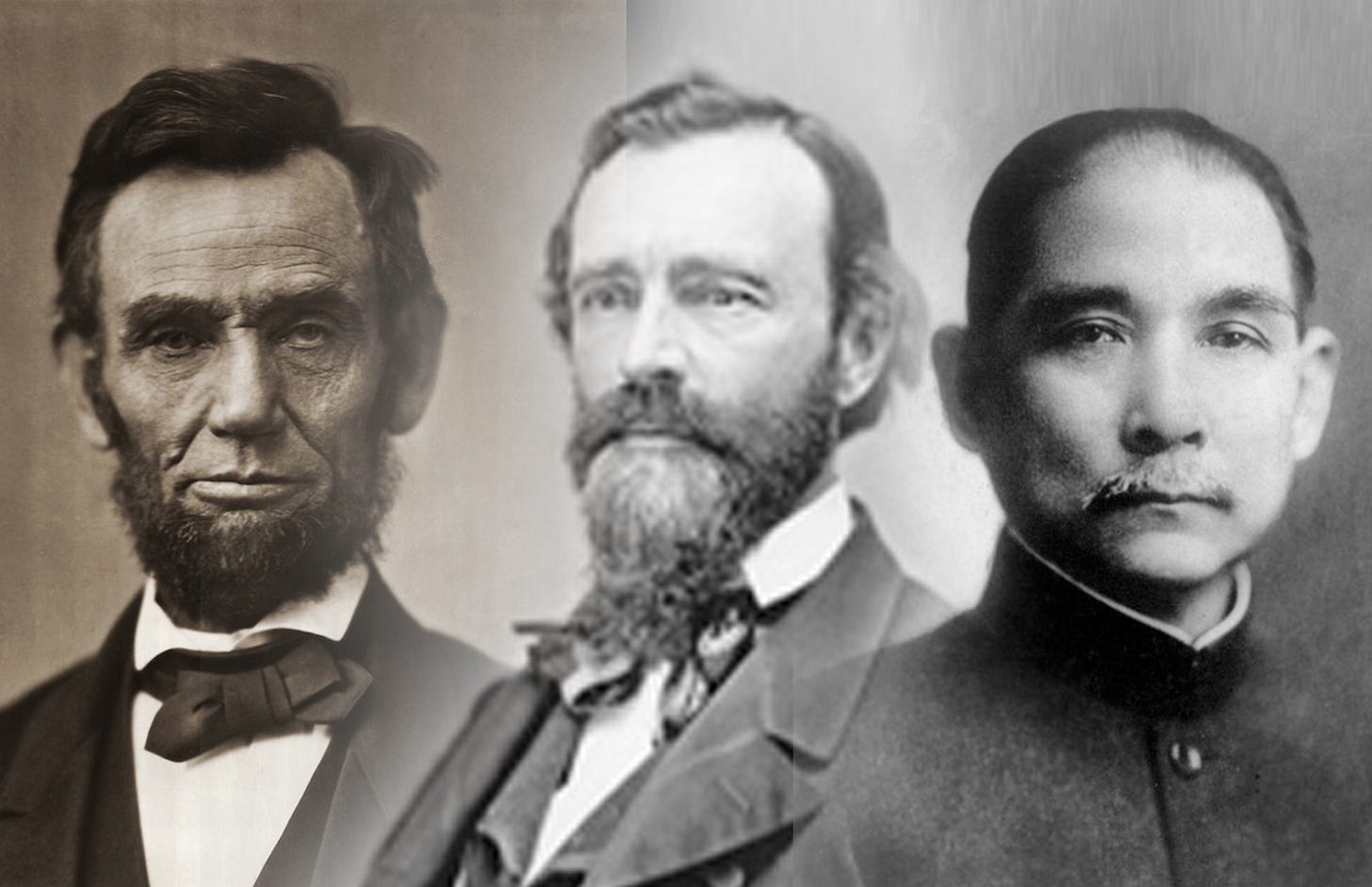
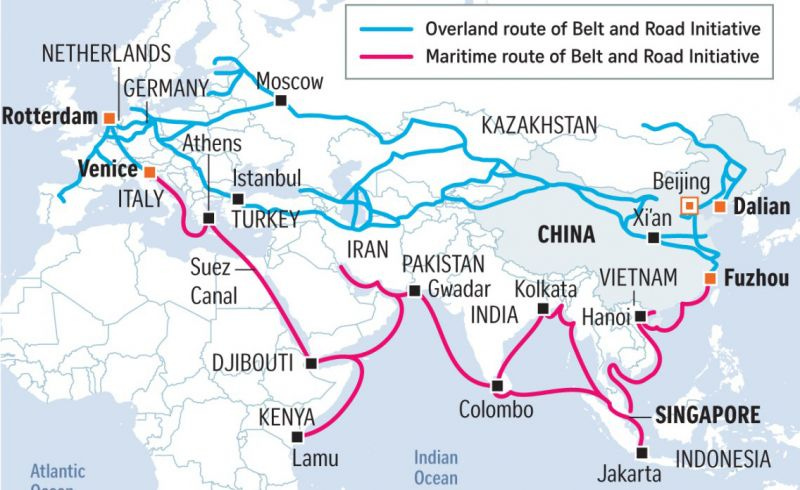
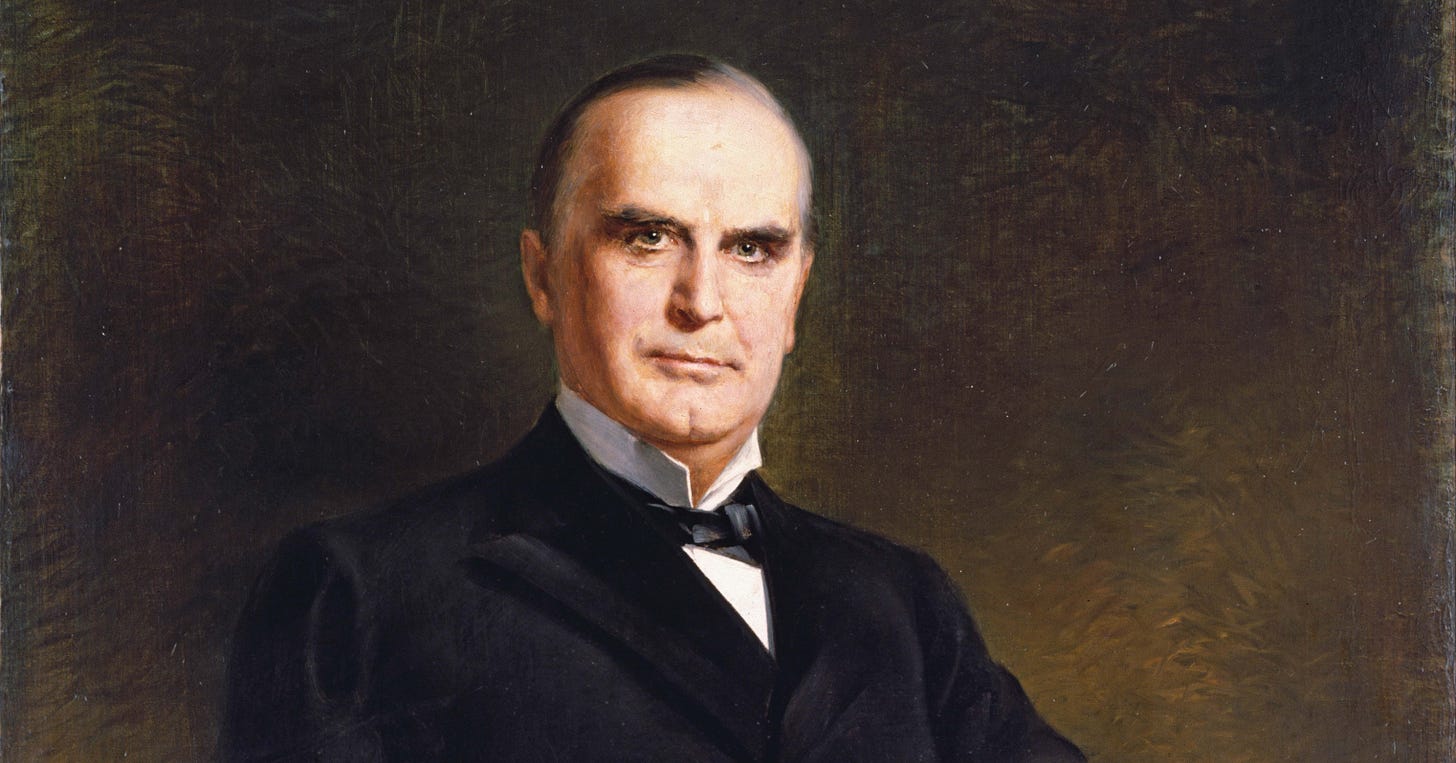
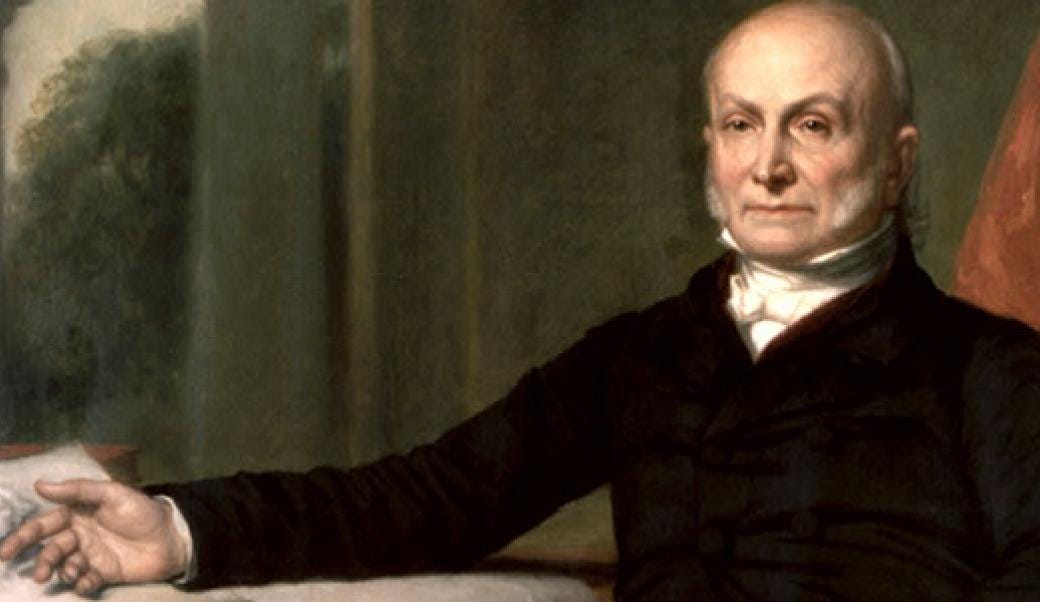
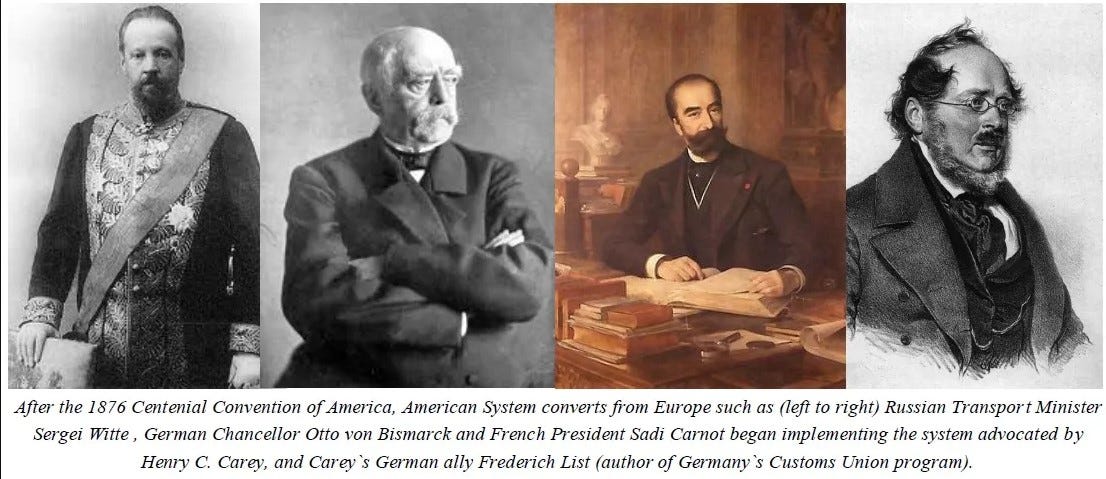
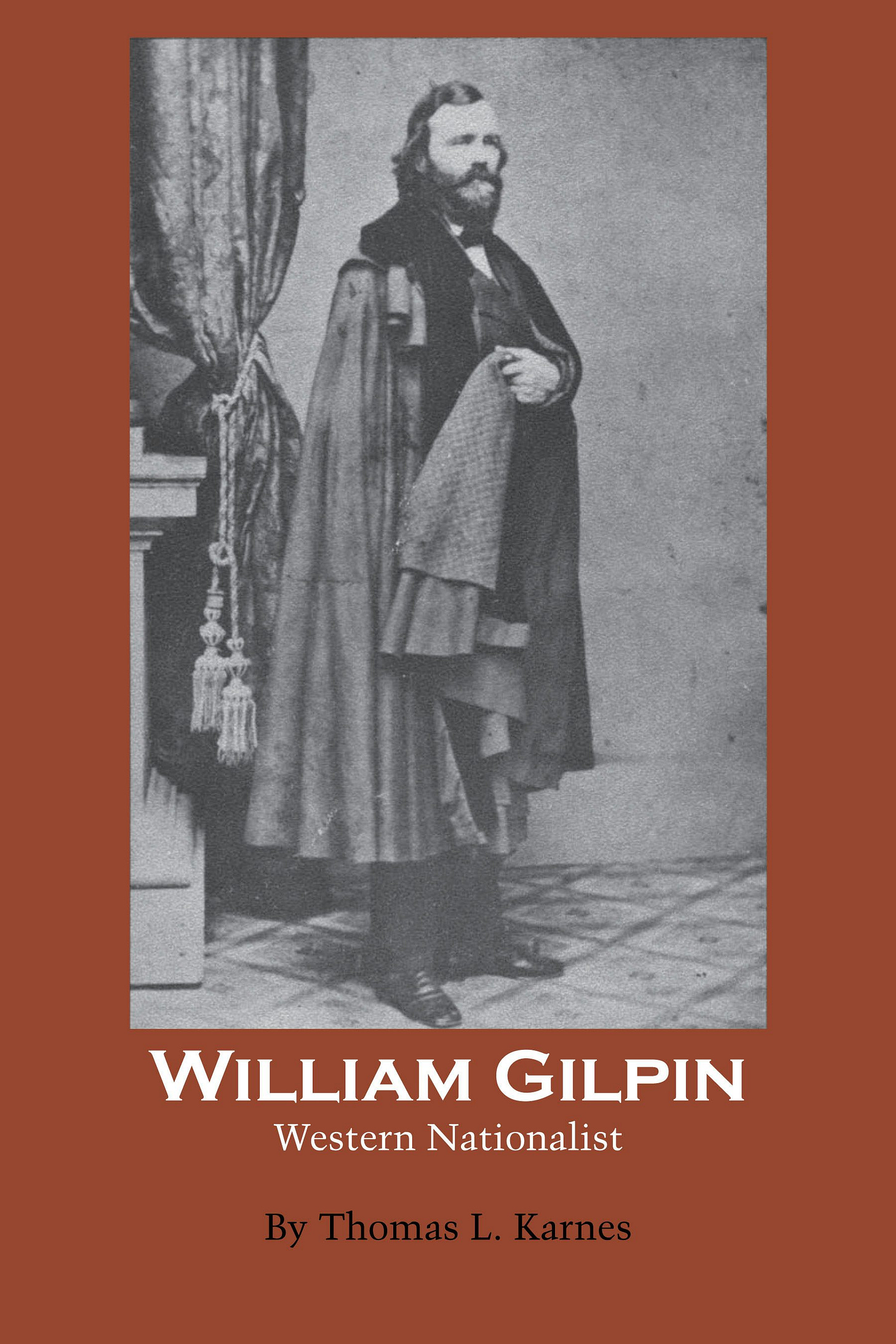
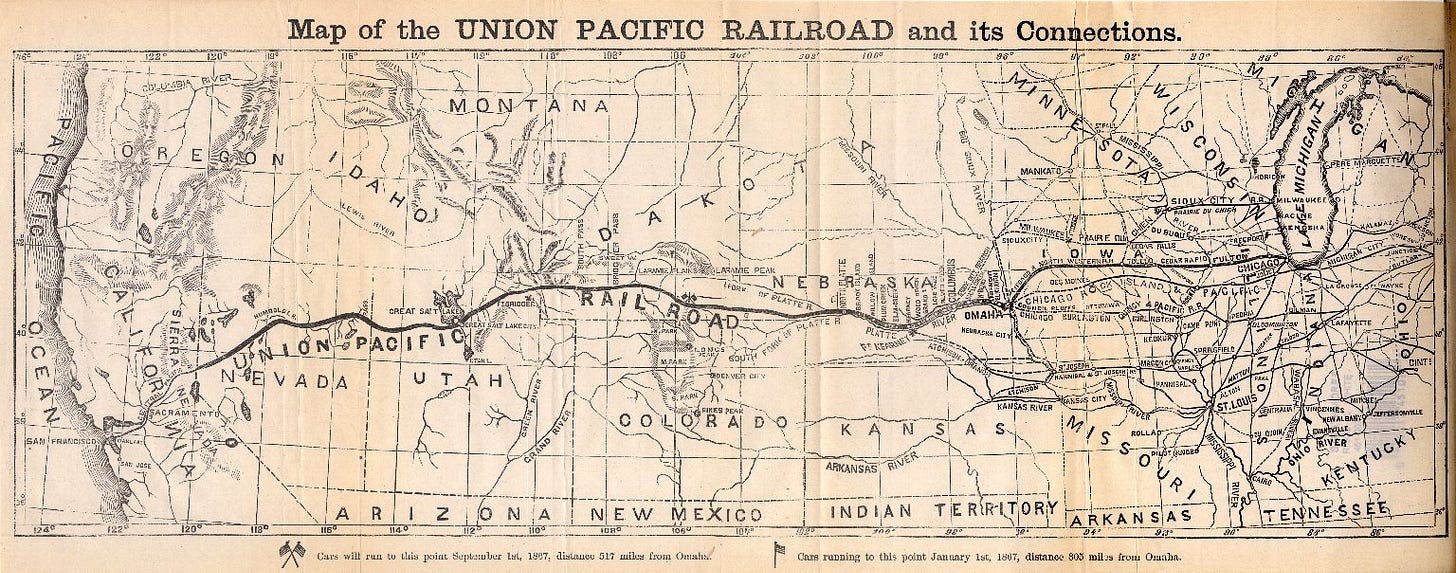
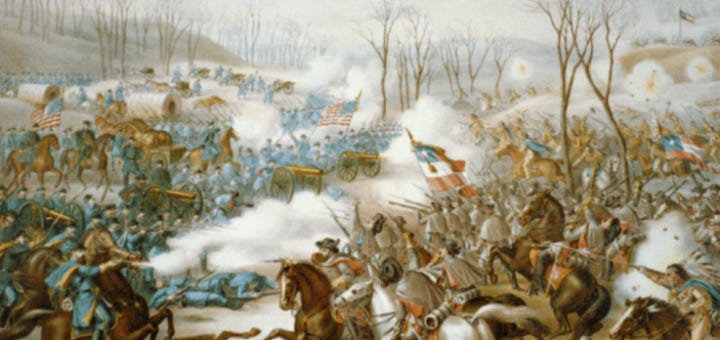
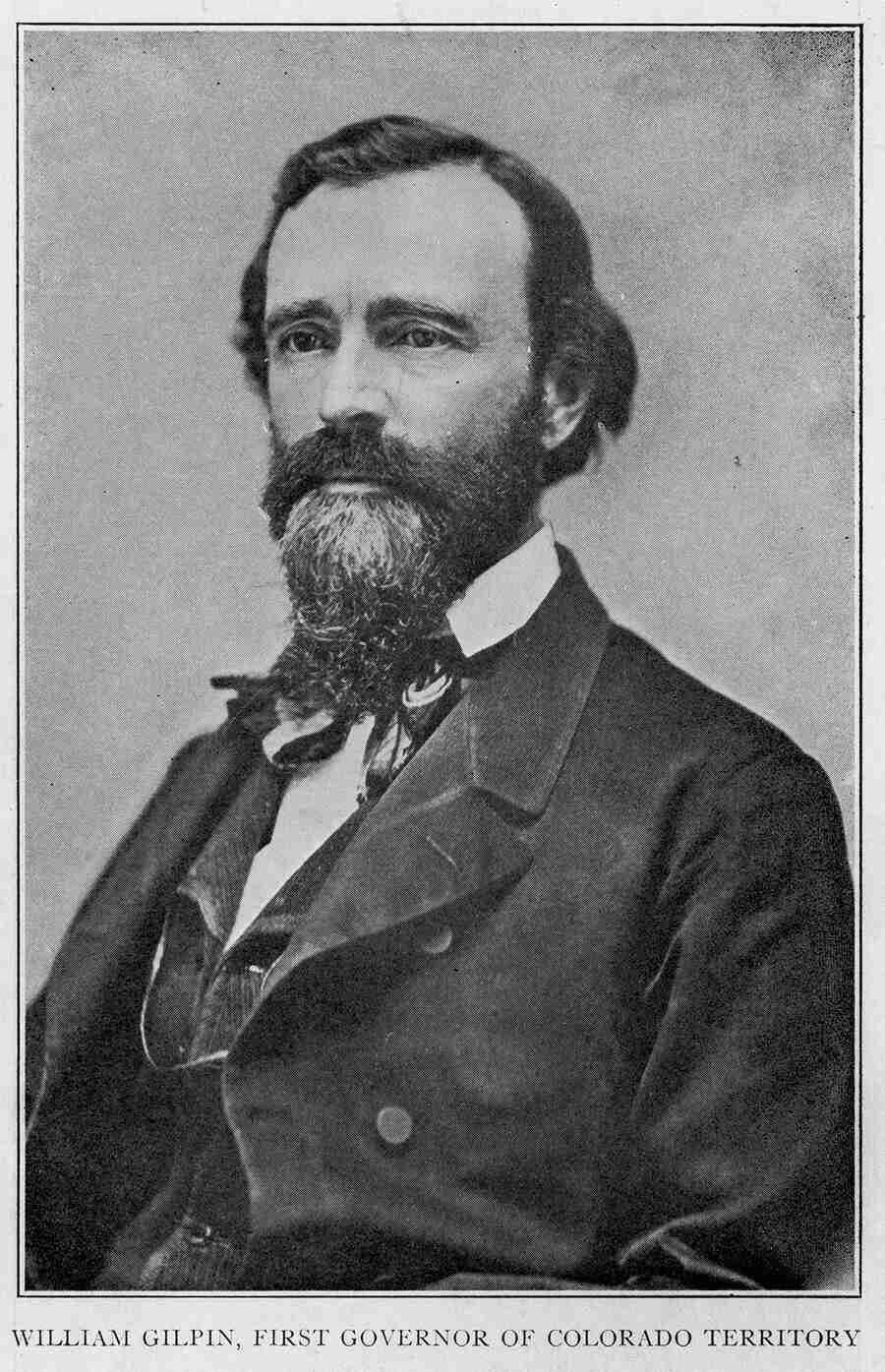
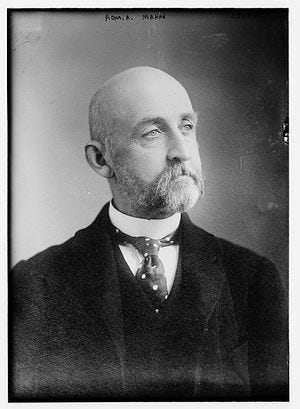
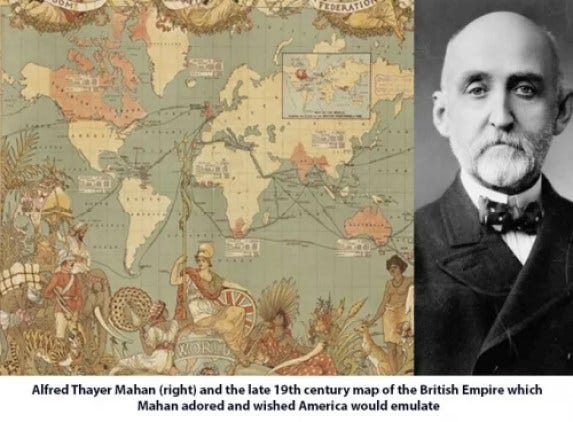
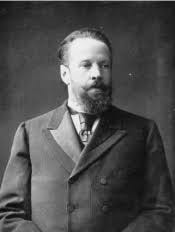
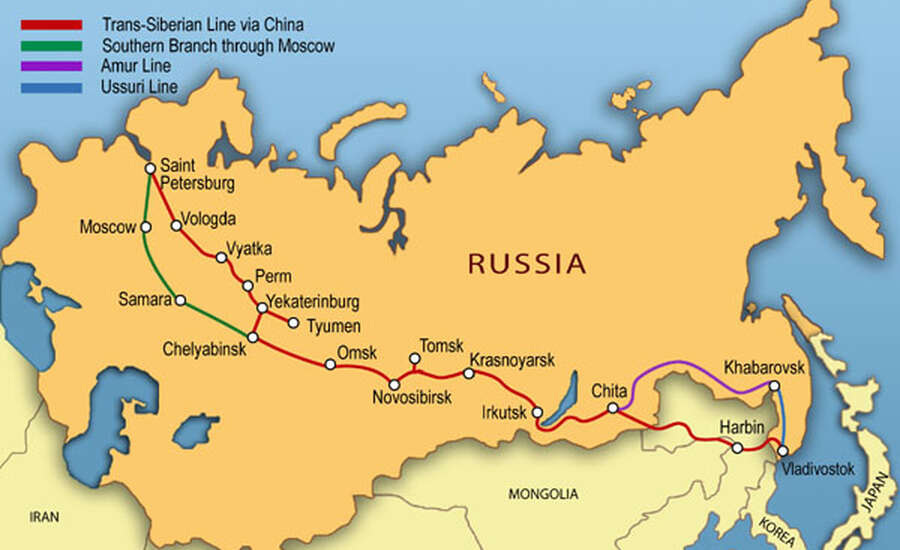
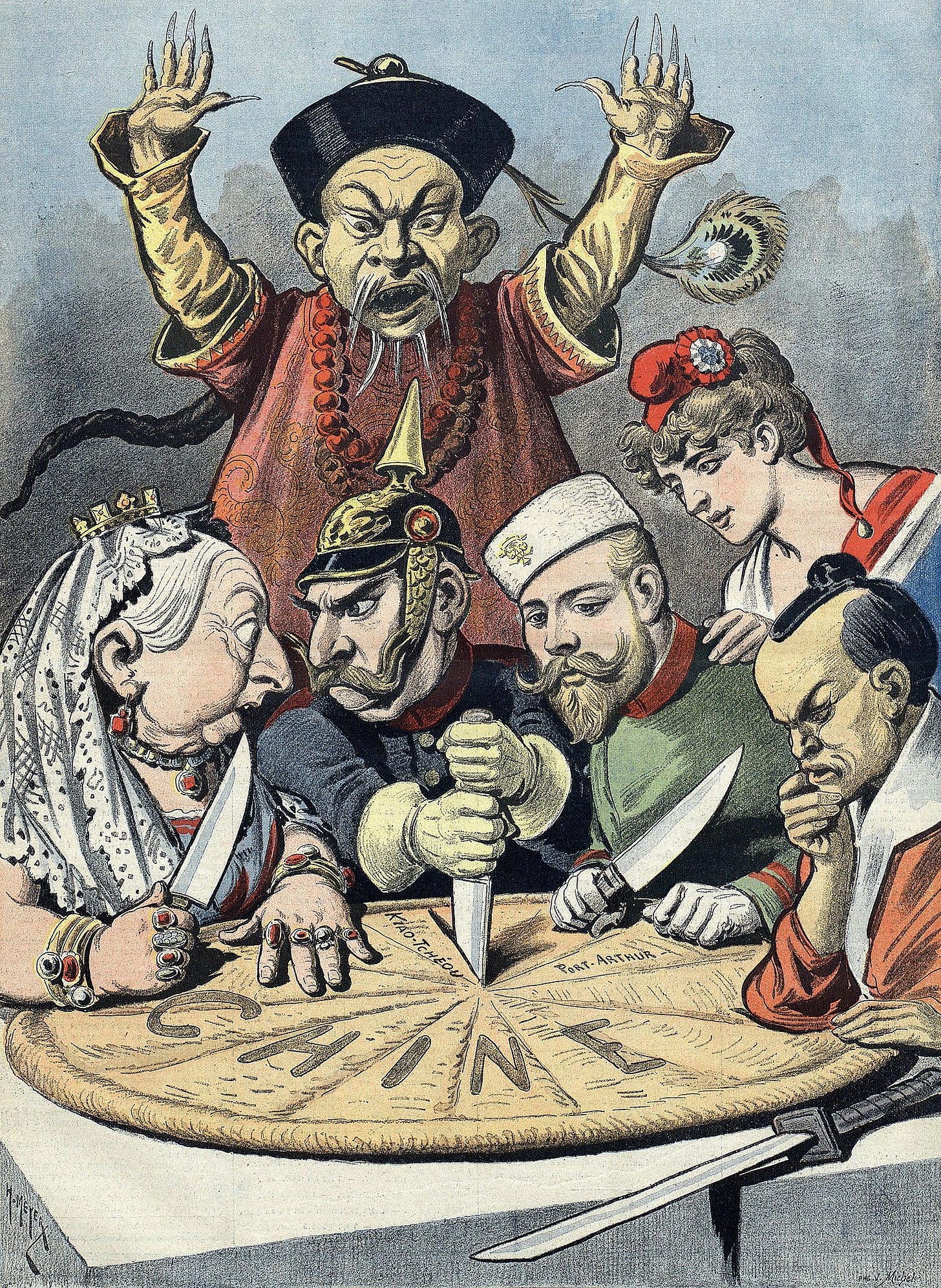
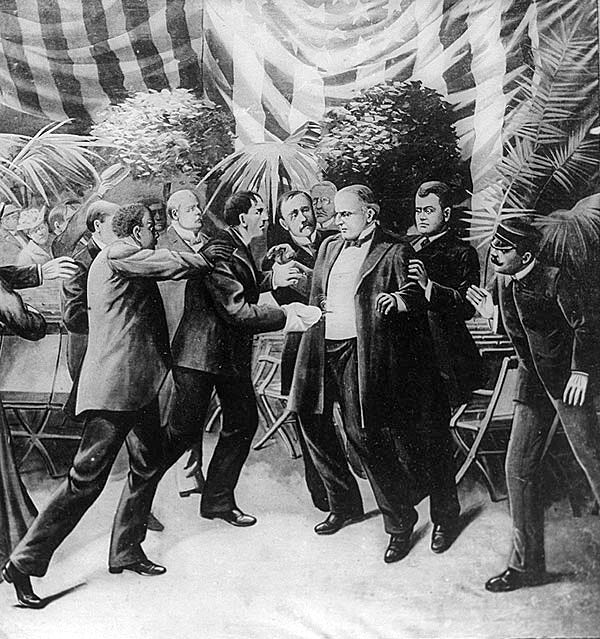
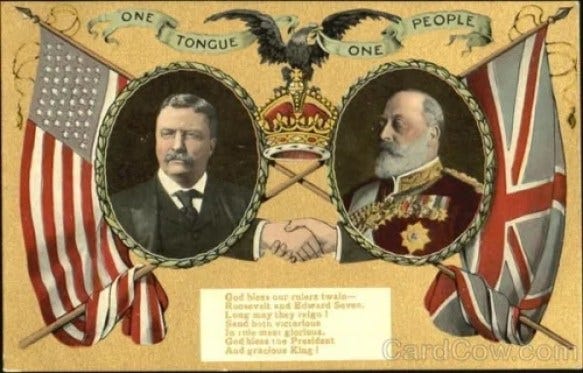
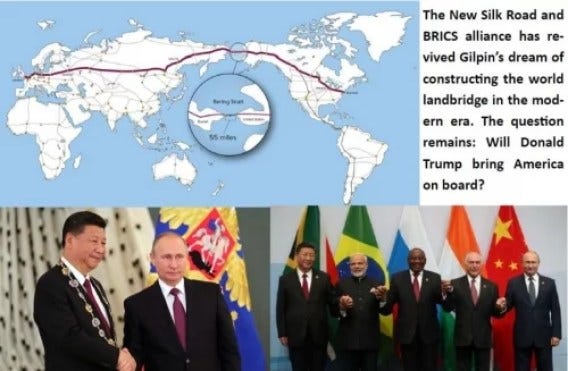




Very educative. Thanks!
This was an amazing and educative reading. Thank you.